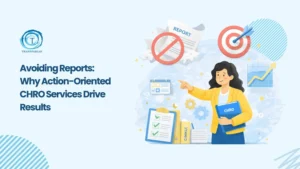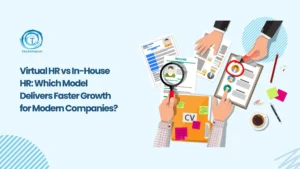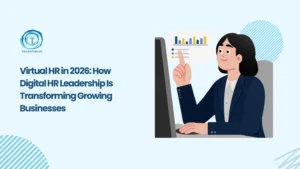In the case of the growing organizations, the strong leadership of the HR is no longer an option but a prerequisite of the scaling, development of the culture, and adherence. Nonetheless, the expenses associated with the employment of a full-time HR chief or CHRO are prohibitive, particularly when it comes to startups, SMEs, or transitioning companies. Here Virtual HR comes in as a game changer model, which will enable organizations to access strategic HR consulting and leadership without carrying full-time salaries and overheads.
In comparison to the previous models of transactional outsourcing, Virtual HR allows companies to access a Fractional CHRO experience, HR leadership consulting, and outsourced CHRO solutions and keep the company culture, compliance, and long-term strategy under control. We shall discuss how this works, what is being requested by organizations and gaps that Virtual HR bridges that traditional models are unable to address.
What Is Virtual HR and Why It Matters
Virtual HR refers to a flexible, on-demand model where HR functions ranging from virtual payroll management to recruitment, compliance, and performance management are delivered remotely by expert consultants or agencies. Unlike traditional outsourcing, which focuses mostly on repetitive administrative tasks, Virtual HR emphasizes strategic HR consulting by providing access to CHRO solutions and CHRO services for companies in a scalable and cost-effective way.
The Real Cost of Hiring vs. Virtual HR
A key driver for adopting Virtual HR is the cost of hiring. A full-time HR leader or CHRO commands a high salary package along with benefits, infrastructure, and training expenses. For smaller organizations, this creates a disproportionate financial burden.
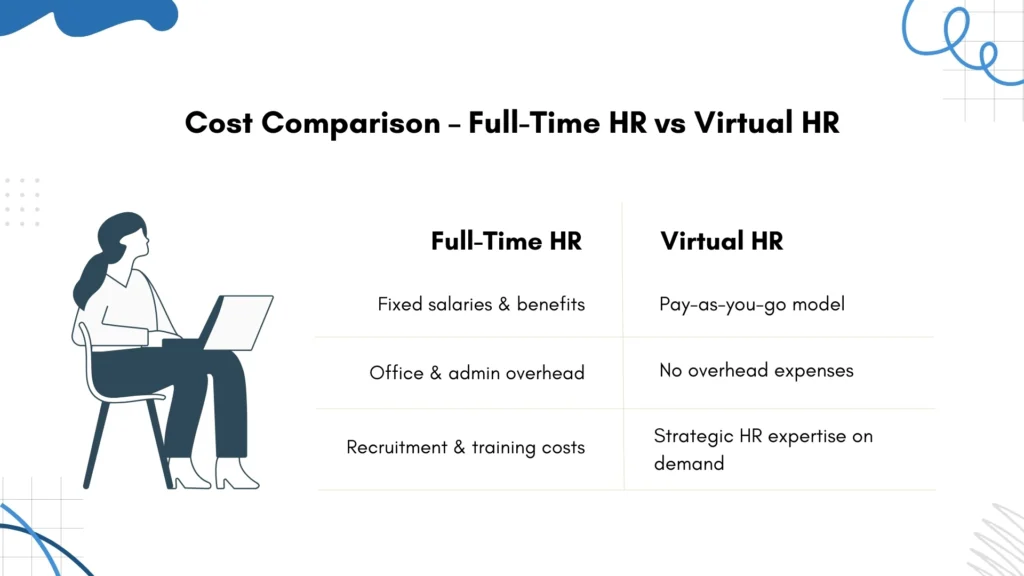
With Fractional CHRO models, businesses gain senior-level HR expertise on a part-time, retainer, or project basis. Working with a fractional HR consultant reduces fixed costs while still delivering the same caliber of strategy, compliance, and leadership. This balance ensures organizations save money while unlocking higher levels of HR impact.
Beyond Cost: The Strategic Value of Virtual HR
Organizations exploring Virtual HR often ask: Will we lose the strategic edge without a full-time HR leader? The answer is no. In fact, the opposite is true.
- With CHRO services offered virtually, companies access executive-level input for workforce planning, leadership pipelines, and engagement strategies.
- HR leadership consulting ensures managers and founders have the right frameworks to build strong people-first cultures.
- Leadership support from a Fractional CHRO means you still get board-level HR guidance without having to commit to permanent roles.
This will help the organization to remain people-centric and focused on business objectives without increasing the cost.
Addressing Compliance and Risk Management
Another issue that is popular: What will guarantee compliance in case HR is not in-house? As labor laws become more complicated, organizations require a HR compliance specialist, who is knowledgeable of the legal requirements, as well as the rights of employees and their readiness to audit.
With Virtual HR, a company has access to the compliance expertise that is part of their continuous operations. Either through contract drafting or leave management or regulatory filings, these services minimize the possibility of fines and protect reputation. This is particularly important when it comes to such industries as healthcare, fintech, or manufacturing.
Transition Playbook: Moving to Virtual HR
Moving from a traditional or minimal HR setup to Virtual HR requires structure and clarity.
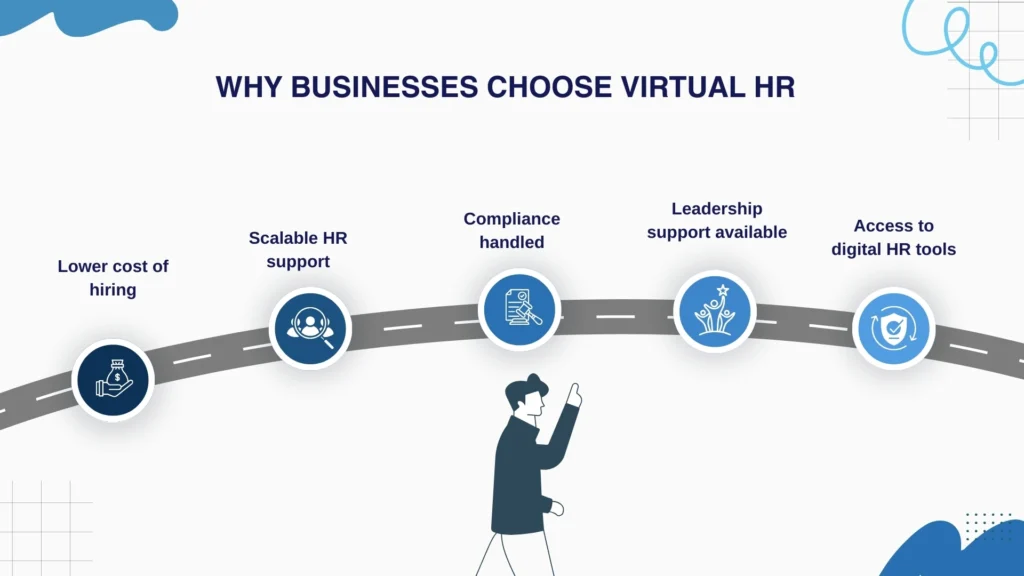
Here’s a simplified playbook:
- Audit current HR practices – List what is being handled internally vs. externally.
- Identify core gaps – Compliance issues, culture-building needs, or leadership voids.
- Choose the right partner – A fractional HR consultant or agency that provides CHRO services for companies with proven expertise in your industry.
- Define scope clearly – Whether you need virtual payroll management, compliance audits, recruitment support, or leadership support.
- Set governance frameworks – Define SLAs, reporting structures, and escalation paths to ensure accountability.
- Integrate with tech – Use HRIS and cloud-based platforms for transparent workflows.
This organized strategy will make sure that Virtual HR is not a short-term band-aid but an enabler in the long term.
Virtual HR in Digital Transformation
The shift toward HR digital transformation makes Virtual HR even more impactful. Modern organizations rely on cloud-based HRIS platforms, applicant tracking systems, and performance dashboards. Virtual HR consultants integrate these tools into daily workflows, making processes faster and more transparent.
Having expertise in the area of the HR consulting service, Virtual HR providers also recommend the selection of the most effective HR tech stack, automation workflows, and analytics dashboards. This makes the HR function data-driven and futuristic without having to incur in-house technology expertise.
Industry-Specific Applications of Virtual HR
Does Virtual HR work across sectors? Yes, though the focus varies depending on business needs.
- Startups: Rely on outsourced CHRO services for policy design, hiring frameworks, and competitive compensation structures.
- SMEs: Focus on virtual payroll management, compliance, and strategic HR consulting to support steady growth.
- Regulated sectors: Depend on a HR compliance consultant to handle labor law complexities and sector-specific mandates.
- High-growth tech firms: Engage Fractional CHRO expertise to guide leadership pipelines and culture-building initiatives.
Measuring the Impact of Virtual HR
Organizations ask: How do we measure the success of Virtual HR? Clear metrics provide the answer:
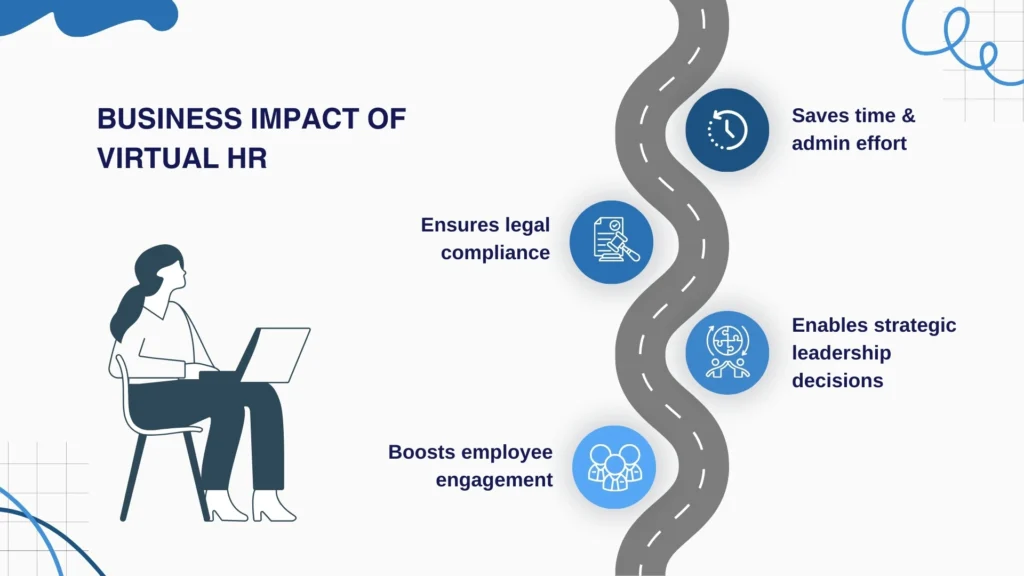
- Lowered cost of hiring compared to full-time roles.
- Improved compliance results and reduced penalties.
- Decreased attrition through strong leadership support and culture initiatives.
- Reduced time-to-hire supported by structured processes.
- Higher employee engagement scores linked to consistent HR guidance.
These KPIs demonstrate how Virtual HR creates measurable impact across people and performance metrics.
Culture and Engagement in a Virtual HR Model
Through HR leadership consulting, Virtual HR ensures culture remains central. Managers receive coaching, leadership pipelines are structured, and employees benefit from consistent engagement initiatives. Regular digital surveys, leadership sessions, and structured communication ensure employees feel supported even without a physical HR department.
Leadership support is critical here, as it provides founders and managers with practical frameworks to sustain employee morale, collaboration, and long-term alignment.
Building the Case for Virtual HR in 2025 and Beyond
The workforce is shifting, distributed teams, flexible staffing, and outcome-driven hiring are now the norm. Businesses don’t need to bear the cost of hiring full-time senior HR roles when Fractional CHRO services and outsourced CHRO services can deliver the same strategic value in a leaner, more adaptable format.
By combining CHRO solutions, strategic HR consulting, Virtual HR platforms, and HR digital transformation, organizations gain the agility to adapt to market shifts without compromising on compliance, leadership, or employee experience.
FAQ’s
By avoiding full-time salaries, benefits, and overheads, Virtual HR lets businesses pay only for the HR consulting services they need.
Yes, many providers include HR compliance consultant support to ensure businesses meet labor laws, statutory requirements, and workplace regulations.
Absolutely. It helps startups gain access to CHRO services for companies without the burden of maintaining a full-time HR headcount.
Through leadership support and HR leadership consulting, Virtual HR helps founders and executives make people-centric business decisions.
A fractional HR consultant provides expertise in areas like compliance, performance, and culture development without the costs of a permanent hire.


